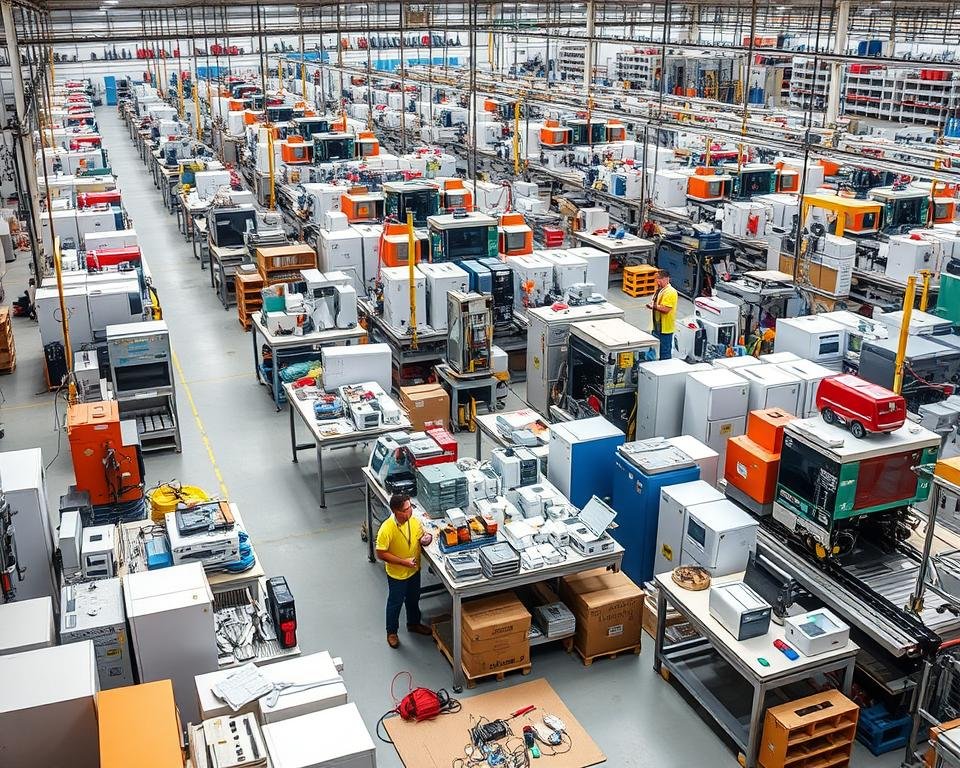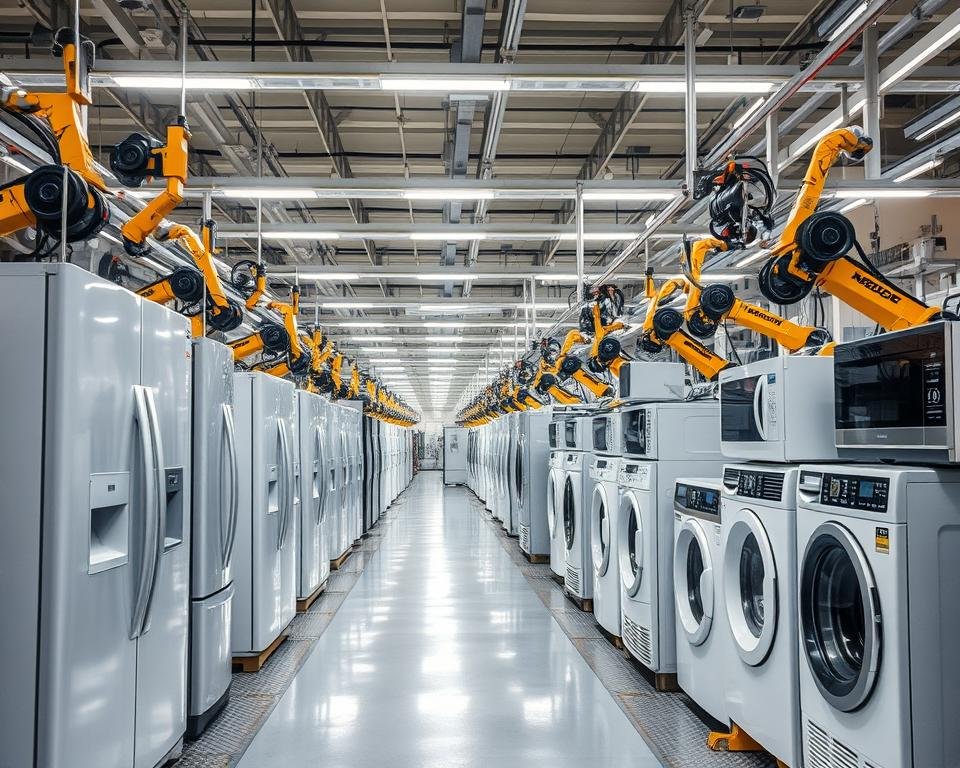The consumer durables industry is key to the U.S. economy. It includes products like home appliances, electronics, furniture, and sporting goods. This sector offers many jobs for those looking for fulfilling careers.
Over the last 70 years, the U.S. has seen steady growth in spending on durable goods. This growth makes job prospects in the consumer durables industry look good.

Economists watch how much people spend on durable goods to see how the economy is doing. When people spend more on durable goods, it means the economy is strong. This makes the consumer durables industry a great place to find a job.
If you’re interested in making things, doing research, selling, or marketing, there’s a place for you. The consumer durables sector has many opportunities for people with different skills and goals.
Understanding the Consumer Durables Industry Landscape
The consumer durables industry is huge and varied. It covers products meant to last more than three years. This includes home appliances, electronics, furniture, cars, and jewelry. With a global value over $3 trillion, it boosts the economy and creates jobs.
Types of Consumer Durable Products and Markets
Consumer durables are split into soft goods and hard goods. Soft goods are things like bedding and linens. Hard goods include electronics and sturdy items. These products serve many markets, from homes to businesses.
Industry Growth and Economic Impact
The industry has faced tough times, like during the COVID-19 pandemic. It lost about 1.4 million jobs then. But, it’s bounced back strong, with durable goods leading the way. As of January 2024, there were 622,000 jobs waiting to be filled, showing growth.
Key Market Players and Manufacturing Sectors
Many big names are in the consumer durables industry. Kimberly-Clark Corp., ABB Ltd., Johnson Controls International PLC, The Clorox Co., Mohawk Industries, and Whirlpool Corp are some. They make a wide range of goods, from appliances to jewelry. Their impact on the economy and job creation is big.

How Many Jobs Are Available in Consumer Durables
The consumer durables industry is booming, with lots of job openings. By January 2024, there were 622,000 total manufacturing job openings in the U.S. Many of these were in durable goods. The industry has been working hard to fill these jobs, with more hiring than quitting.
About 3 million people work in the consumer durables industry in the U.S. Big names like Apple, General Electric, Samsung, and others are major employers. They hire hundreds of thousands of people.
The education and health services, and professional and business services sectors have the most job openings. These include jobs in manufacturing and production, research and development, sales and marketing, and more. There are many durable goods employment opportunities available.

The industry is growing, and so are the job opportunities. If you have the right skills, you can find a fulfilling career in consumer durables. It’s a dynamic and changing field.
Career Paths and Employment Opportunities in Consumer Electronics
The consumer electronics sector has many career paths. It caters to different skills and interests. You can find jobs in manufacturing, research, sales, and marketing. These roles offer rewarding careers in consumer products.
Manufacturing and Production Roles
Manufacturing in the consumer durables industry involves making durable goods. This includes household appliances, electronics, and furniture. These jobs need technical skills, problem-solving, and quality focus.
Production Supervisors can earn between $56,000 and $82,000 a year. Quality Assurance Specialists make between $50,000 and $82,000 annually.
Research and Development Positions
R&D roles focus on making new products and improving existing ones. Mechanical Engineers, in high demand, can earn $86,000 to $136,000 a year. They design, test, and enhance products to meet market needs.
Sales and Marketing Careers
Sales and marketing careers are key for promoting and selling consumer durables. They need understanding of consumer behavior and market trends. Sales Representatives can earn $55,000 to $101,000 a year. Marketing Managers make around $100,000 in the U.S.
Every career in consumer electronics requires looking ahead to future needs and trends. The journey from idea to launch can take up to five years. Important questions include product usage, technology impacts, and consumer research patterns.
“The consumer durables industry offers an estimated average salary of $65,000 for entry-level positions and over $100,000 for experienced professionals in 2023.”
Skills and Qualifications Required in the Durable Goods Sector
The consumer durables industry needs a wide range of skills and qualifications. Technical skills are key for jobs in manufacturing and R&D. These roles require a deep understanding of how things are made and designed.
Sales and marketing jobs need strong communication and analytical skills. They also require knowing how to understand what customers want.
Knowing the industry well is important in the durable goods sector. This is because products take longer to make and sell. People in this field must predict trends and meet customer needs. Also, digital skills are getting more important as technology changes the industry.
To do well in the consumer durables industry, you need technical, sales, and problem-solving skills. The job market in this sector is growing fast, with billions of dollars and millions of jobs worldwide. Knowing what skills you need and keeping them up to date can lead to many career opportunities in the consumer durables industry jobs.
“The US economy relies significantly on durable consumer goods, generating billions of dollars and millions of jobs globally.”
Some important skills and qualifications for the durable goods sector include:
- Technical expertise in engineering, manufacturing, and design
- Good communication and people skills for sales and customer service
- Ability to analyze and solve problems to understand what customers want
- Digital skills and knowledge of technology to keep up with changes
- Understanding of the industry and consumer behavior
- Skills in managing projects and working with teams
By working on these skills and qualifications, job seekers can be ready for success in the consumer durables sector. They can take advantage of the many job opportunities in this field.
Remote Work and Flexibility in Consumer Durables Jobs
The pandemic has changed how we work in the consumer durables industry. Remote work is not as common as it was in 2021, but it’s more common than before the pandemic. Jobs that don’t need a lot of physical are more likely to be remote. But, jobs in manufacturing often need people to be on-site.
Hybrid Work Models in Manufacturing
The industry is moving towards hybrid work models. This means people work both in the office and from home. It combines the benefits of teamwork with the flexibility of working from home. Companies are trying to find the right balance for their workers and production needs.
Digital Transformation Impact
The pandemic sped up the digital transformation in the consumer durables industry. New skills and roles are needed because of technology like automation and data analytics. Workers in this field must keep up with these changes to stay competitive.
Future of Work Trends
The future of work in consumer durables will mix on-site and remote work. Employers will need to create flexible, innovative, and tech-driven workspaces to attract the best workers. The employment in consumer durables manufacturing will keep changing as the industry and workforce evolve.
“The pandemic has accelerated the adoption of remote work and digital technologies in the consumer durables industry, transforming the way we approach employment and the future of work.”
Salary Ranges and Benefits in Consumer Durables
The consumer durables industry offers good salaries and great benefits. Salaries vary based on the job, experience, and company size. But, the industry provides stable jobs with good pay.
Some top jobs in the durable goods employment opportunities include:
- Quality Control Manager – average annual salary of $118,000
- Marketing Manager – average annual salary of $113,000
- Strategy Consultant – average annual salary of $111,407
- Automobile Sales Manager – up to $106,000 per year
- Robotics Engineer – average annual salary of $105,223
- Electronics Engineer – average annual salary of $95,013
- Product Manager – average annual salary of $90,323
- Finance Manager – average annual salary of $90,251
Jobs in the consumer durables industry also come with great benefits. These include health insurance, retirement plans, and chances to grow professionally. Some companies even offer flexible work hours, training programs, and help with childcare to keep their best workers.
The consumer durables industry is a solid and rewarding field. It offers many high-paying jobs and lots of benefits for its employees. With a focus on long-term products, it’s perfect for those looking for stable, well-paying careers.
Conclusion
The consumer durables industry has many career paths. You can work in manufacturing, research, sales, or marketing. Despite pandemic challenges, it’s growing steadily.
This growth is thanks to a focus on quality and sustainability. These values attract loyal customers and boost profits.
The industry is changing with digital technology and new work models. This brings exciting opportunities for those looking for stable, innovative jobs. Roles range from quality control managers and robotics engineers to marketing managers and product designers.
If you’re interested in job prospects in the consumer durables sector or careers in consumer products, the future looks bright. Keep up with trends, develop key skills, and network. This will help you succeed in this dynamic field.